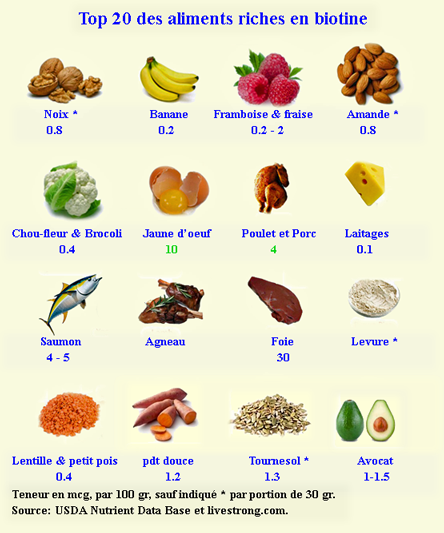Why Biotin deficiencies are considered "rare"?
-
I don't understand why. It's pretty hard to get 100% RDA of biotin, and eggs have avidin that inhibit absorbtion of b7.
-
We seldom lack biotin. Mind if woman (pregnancy) and in dysbiosis or leaky gut

-
@LucH doesn't make sense. Did you know that RDA is 30mcg? Who eats liver everyday?
-
=> See half-life of biotin. You don't burn B7 at every step.
Chris Masterjohn says 150 mcg is required when eating 100 gr meat (non-collagen)
35 mcg gr every 50 gr supplement meat. -
@LucH i want to know the mechanism behind it. Not X opinion without arguments.
-
@LucH i want to know the mechanism behind it. Not X opinion without arguments.
-
I've been wondering this for a few months now lol. If you actually track your biotin intake you're probably deficient unless you eat 3 eggs or liver every day. Cooking egg whites makes it much less effective at binding to biotin, although precisely how much I'm not sure.
One thing to note is that coffee, and presumably espresso even more so (since its nutrients are about 1.274x more concentrated than coffee), has very significant amounts of biotin that aren't included in most food databases: https://plaza.umin.ac.jp/~e-jabs/2/2.109.pdf but I'm not sure how to calculate exactly how much biotin is in a given amount of coffee; the paper is quite confusing. If someone could work out the numbers that would be excellent.
"''Biotin content table', based on the combination of published data in Japan and foreign countries. Of these, the biotin contents of some foods such as peanuts, red peppers, liver (cattle, swine, and chicken), kidney (cattle), eggs (yolk), instant coffee, baker's yeast (dried), and royaljelly were over 50 µg/100g per food."
edit: this page claims 88.4 mcg per 100g instant coffee: https://wholefoodcatalog.info/nutrient/vitamin_b7(biotin)/foods/high/
-
Doesn’t our gut bacteria produce biotin as well
-
@forty said in Why Biotin deficiencies are considered "rare"?:
I've been wondering this for a few months now lol. If you actually track your biotin intake you're probably deficient unless you eat 3 eggs or liver every day. Cooking egg whites makes it much less effective at binding to biotin, although precisely how much I'm not sure.
One thing to note is that coffee, and presumably espresso even more so (since its nutrients are about 1.274x more concentrated than coffee), has very significant amounts of biotin that aren't included in most food databases: https://plaza.umin.ac.jp/~e-jabs/2/2.109.pdf but I'm not sure how to calculate exactly how much biotin is in a given amount of coffee; the paper is quite confusing. If someone could work out the numbers that would be excellent.
"''Biotin content table', based on the combination of published data in Japan and foreign countries. Of these, the biotin contents of some foods such as peanuts, red peppers, liver (cattle, swine, and chicken), kidney (cattle), eggs (yolk), instant coffee, baker's yeast (dried), and royaljelly were over 50 µg/100g per food."
edit: this page claims 88.4 mcg per 100g instant coffee: https://wholefoodcatalog.info/nutrient/vitamin_b7(biotin)/foods/high/
Interesting. It still hard to get the RDA 30mcg knowing that not everyday you eat liver, milk doesn't have any and one coffee contains around 3g of instant coffee, maybe the espresso has more, but still. Eggs inhibit biotin absorption.
It's weird how nobody talks about biotin. It seems that mainstream sees it as a vitamin only for nails and hair growth. -
@forty said in Why Biotin deficiencies are considered "rare"?:
I've been wondering this for a few months now lol. If you actually track your biotin intake you're probably deficient unless you eat 3 eggs or liver every day. Cooking egg whites makes it much less effective at binding to biotin, although precisely how much I'm not sure.
One thing to note is that coffee, and presumably espresso even more so (since its nutrients are about 1.274x more concentrated than coffee), has very significant amounts of biotin that aren't included in most food databases: https://plaza.umin.ac.jp/~e-jabs/2/2.109.pdf but I'm not sure how to calculate exactly how much biotin is in a given amount of coffee; the paper is quite confusing. If someone could work out the numbers that would be excellent.
"''Biotin content table', based on the combination of published data in Japan and foreign countries. Of these, the biotin contents of some foods such as peanuts, red peppers, liver (cattle, swine, and chicken), kidney (cattle), eggs (yolk), instant coffee, baker's yeast (dried), and royaljelly were over 50 µg/100g per food."
edit: this page claims 88.4 mcg per 100g instant coffee: https://wholefoodcatalog.info/nutrient/vitamin_b7(biotin)/foods/high/
Interesting. It still hard to get the RDA 30mcg knowing that not everyday you eat liver, milk doesn't have any and one coffee contains around 3g of instant coffee, maybe the espresso has more, but still. Eggs inhibit biotin absorption.
It's weird how nobody talks about biotin. It seems that mainstream sees it as a vitamin only for nails and hair growth. -
@Androsclerozat Does anybody actually hit the RDA targets of every nutrient and mineral that food can provide? That sounds like a nearly impossible task to me.
-
@oliveoil said in Why Biotin deficiencies are considered "rare"?:
@Androsclerozat Does anybody actually hit the RDA targets of every nutrient and mineral that food can provide? That sounds like a nearly impossible task to me.
Yes I do, but it's pretty hard to be consistent. With 1.5 l orange juice, 1 l milk, 250g ground beef and dark chocolate 50g you already have all full except manganese and biotin. It's expansive though.
-
@oliveoil I hit every RDA on 95% of days. It's not that difficult with a diet largely based around milk. A diet composed mostly of milk, eggs, beef, orange juice, and certain nutrient dense leafy vegetables like spinach makes it very easy. Espresso is also an incredibly good source of B3, B7, and magnesium, all of which are somewhat difficult to get enough of (B3 is easy with enough meat but difficult without). Track nutrient intake with cronometer.